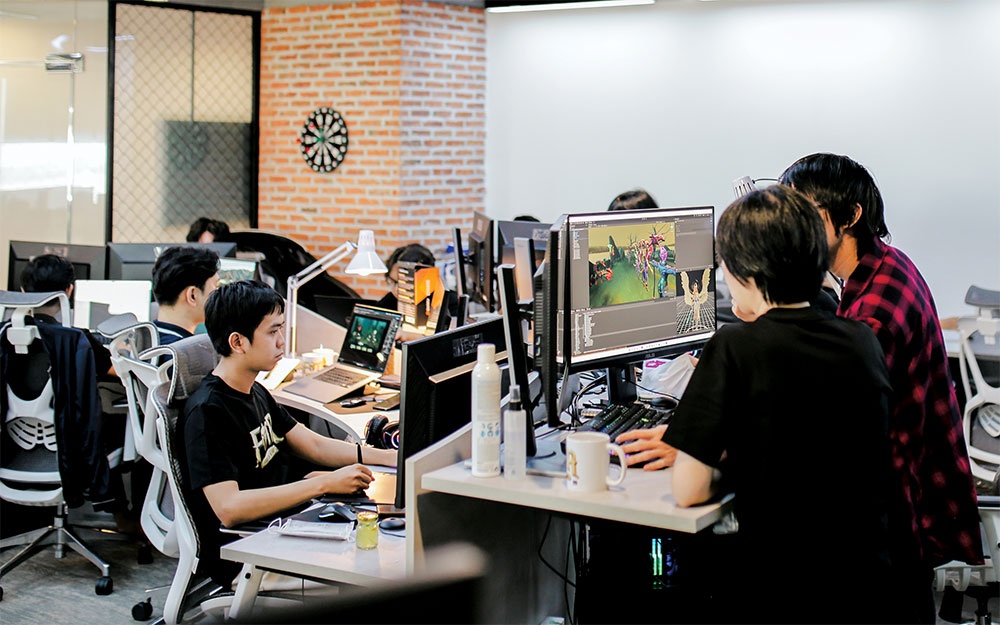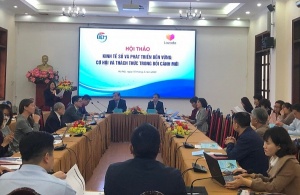Vocational training takes on digital slant
Owning 10 industrial parks (IPs) with more than 1,700 foreign-led projects, the northern province of Bac Ninh is currently one of the localities with the largest concentration of IPs and foreign enterprises in Vietnam, and also home to a vibrant job market. Vocational training institutions in Bac Ninh therefore also focus on renewing training programmes to closely follow the actual needs of enterprises, especially the demand for human resources who are eager to learn and able to use modern machinery and equipment.
Nguyen Quoc Huy, rector of Bac Ninh College of Electrical Engineering and Construction, said that vocational education linking to the needs of businesses is the fastest way to help students adapt to the actual working environment, reduce retraining time, and save costs for both businesses and employees.
Bac Ninh College of Industry is also one of the agile vocational training institutions when making the most of social media platforms to enroll students. “We also invest in 4.0 technology equipment to meet the training needs of auxiliary technology enterprises in the high-tech field. I think that along with quality assurance to satisfy businesses, ensuring output will also help vocational training institutions to attract more students,” Huy said.
 |
| Vocational training takes on digital slant, Photo: Pham Van |
The lack of skilled workers, especially the skills to receive and use modern machines and technologies, is a weakness of the Vietnamese labour market, which is known as a source of abundant labour resources, but mainly low-cost labour.
According to the Total Workforce Index 2022 report, Vietnam’s skilled workers accounted for just 11.6 per cent of the total. This is a weakness of Vietnamese workers when compared to other markets in Southeast Asia, such as Thailand with a high skilled labour rate of about 15 per cent, the Philippines (18.5 per cent), and Malaysia (28.2 per cent).
In the future, cheap labour may no longer be as important to foreign investors as the skill factor. One-third of foreign-invested enterprises in the manufacturing industry are currently applying modern technology at a very high level, according to a ManpowerGroup Vietnam survey covering 2021-2023 and which was created in collaboration with the Institute of Science, Labour, and Social Affairs and included over 200 enterprises across the country,
Meanwhile, the number of enterprises applying technology at an average level accounts for 63 per cent, and only 5 per cent is not currently applying technology. According to ManpowerGroup, 57 per cent of businesses faced difficulties in recruiting high-quality human resources in the second half of 2022.
“Businesses are increasingly placing high demands on skilled workers, while the current training situation and workforce cannot keep up,” said general director of ManpowerGroup Vietnam Andree Mangels. “Vietnamese workers need to improve both soft skills and expertise, otherwise they will lose their opportunities to other markets.”
According to the General Directorate of Vocational Education and Training (GDVET) under the Ministry of Labour, Invalids, and Social Affairs (MoLISA), Vietnam currently has over 1,900 vocational education institutions, including 400 colleges, 440 intermediate schools, and more than 1,000 dedicated centres.
There are also nearly 700 private and foreign-invested vocational training institutions, accounting for 36 per cent, while the number of related education enrolments each year reaches about 2.2 million people.
Although the quality and effectiveness of vocational education has improved, more in line with the actual needs of the labour market with the rate of 80 per cent of workers attaining jobs soon after graduation, the GDVET indicated that digital transformation is one of the most important solutions to improve the quality of vocational training.
The nation’s digital transformation programme in vocational education for 2021-2025 sets a target of 100 per cent of output training standards of qualifications being integrated with digital capabilities. The MoLISA is also developing an amended Law on Employment, which includes a group of policies on developing vocational skills and improving the quality of human resources.
The vocational training model is also gradually shifting from traditional face-to-face training to distance teaching. Many vocational education institutions have begun to digitalise materials, and some have cooperated with external organisations to use digital libraries. Especially in engineering sectors, some industries such as electromechanics and automobiles are applying simulation programmes and electronic learning materials.
“The restrictions of the past few years have made many vocational education institutions ready to update their technology to ensure training activities in any situation, including changing the learning and teaching process, and investing in VR and simulation technology to promote distance teaching,” said Dong Van Ngoc, rector of Hanoi College of Electro Mechanics.
Pham Vu Quoc Binh, deputy director of the GDVET, said that the digital transformation will change vocational education activities, from the way of management and teaching to learning and practising related skills at dedicated education institutions. “Digital transformation will also create many new professions and fields, forming a potential new job market, but it will also be more challenging for vocational education activities,” Binh said.
Meanwhile, many foreign enterprises are also willing to cooperate. David Wei, general director of Huawei Vietnam, said it will cooperate with partners to form 15 academies, and work with 100 universities and organisations to provide training for more than 10,000 students in the industry. “Huawei is willing to cooperate with Vietnamese universities and academies to develop high-quality local human resources through increasing knowledge transfer and promoting greater understanding as well as participation in the digital community,” Wei said.
| Hoang Duc Trung-Partner, VinaCapital Ventures | |
ICT human capital in Vietnam is up there with all the countries in the region. Generally speaking, technology and digital skills of the general workforce is also good. In fact, many companies are facing a lot of competition when it comes to attracting ICT personnel because now there are many highly qualified Vietnamese people choose to work abroad. Big tech unicorns in the region are having in their resource many top-tier Vietnamese ICT talents. Many applications such as Zalo and VNPay were built by Vietnamese talents and are attracting plenty of users. All of our investments must have an element of technology. We use technology to solve the problems of the market and of life. One of the companies that we invest in is PNJ, which has made good use of technology to increase its market presence and growth. If digital transformation in general in Vietnam is still difficult, it is because it is a great change of all systems, in which synchronisation is a challenge. From the data entry process to other processing tasks, it is a process that changes the behaviour of both users and system operators. If there’s one side that’s not ready for that, it is hard. | |
| Tran Quang Thuc - Director of Talent and Culture Hôtel des Arts Saigon | |
For our hotel, we will only need to hire 8-10 per cent staff to expand the business as we recruited enough staff for the operation. However, the hospitality industry will still face many difficulties when it comes to recruitment issues. First of all, there was a sudden increase in the number of tourists last year, so it was quite challenging to hire employees to support the business during peak season. Many people left the industry in recent years and this led to the severe lack of experienced employees. Digitalisation will play a significant role in not only tourism but also in other industries. Nowadays, our customers are young people who have a strong passion for travelling and exploring new horizons. They find it easier to get access to information through different sources and platforms. Therefore, digitalisation in tourism becomes important. AI and Industry 4.0 tools will become much more popular in tourism and travel sector. Before deciding to take a trip, the first thing people always do is to look for information and advice. The need for accurate and fast information can help them choose the best place or the most suitable time with reasonable price. If people working in tourism can make good use of AI, they can benefit a lot from it. | |
| Pham Qui Toan - CEO, Gumi Solutions | |
Currently, there is no shortage of businesses providing products and services for digital transformation, but meeting customers’ demands and ensuring the effectiveness after implementing digital transformation remain problems many firms face. Therefore, we continue to look for team members who have knowledge of service consulting, with highly professional analysis skills, and good technical capacity to be able to solve customers’ pain points. Lacking of practical experience is a challenge for Vietnamese personnel. Although universities and IT training centres already provide basic knowledge to students, many fields in IT require practical experience to put that knowledge into practice. Schools need to work closely with companies to meet practical needs; students’ internship should start from the third year. There should be practical projects that students can participate in instead of learning basic and fragmented knowledge. In addition to professional knowledge, IT human resources also need soft skills such as communication, teamwork, time and stress management, and research. However, many students and IT staff in Vietnam lack these skills, making it difficult to work effectively with colleagues and customers. |
 | Vietnam lucrative market for digital economy Vietnam is believed to be a lucrative market for digital economy with the second fastest growth pace in the world last year, after India. |
 | Digital economy to reach $50 billion by 2050 The scale of Vietnam's digital economy could hit $50 billion by 2050, of which, e-commerce will be the most important contributor. |
 | AI wave set to sweep tech market The trend for digital transformation and the push from new technology have created momentum for platforms and products applying AI to develop in Vietnam. |
 | Vietnam, US seek to boost ties in digital economy Minister of Information and Communications Nguyen Manh Hung on February 13 met with US Trade Representative Katherine Tai and US Ambassador to Vietnam Marc E. Knapper to discuss boosting bilateral ties in digital economy and digital trade. |
What the stars mean:
★ Poor ★ ★ Promising ★★★ Good ★★★★ Very good ★★★★★ Exceptional
Related Contents
Latest News
More News
- A golden time to shine within ASEAN (February 19, 2026 | 20:22)
- Vietnam’s pivotal year for advancing sustainability (February 19, 2026 | 08:44)
- Strengthening the core role of industry and trade (February 19, 2026 | 08:35)
- Future orientations for healthcare improvements (February 19, 2026 | 08:29)
- Infrastructure orientations suitable for a new chapter (February 19, 2026 | 08:15)
- Innovation breakthroughs that can elevate the nation (February 19, 2026 | 08:08)
- ABB Robotics hosts SOMA Value Provider Conference in Vietnam (February 19, 2026 | 08:00)
- Entire financial sector steps firmly into a new spring (February 17, 2026 | 13:40)
- Digital security fundamental for better and faster decision-making (February 13, 2026 | 10:50)
- Aircraft makers urge out-the-box thinking (February 13, 2026 | 10:39)




 Tag:
Tag:
















 Mobile Version
Mobile Version